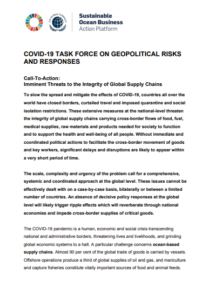The UN Global Compact issued a set of recommendations for urgent political action to keep global ocean-related supply chains moving during the COVID-19 pandemic. The recommendations are a consolidation of the work of the COVID-19 Task Force, initiated by the UN Global Compact’s Action Platform for Sustainable Ocean Business.
Closed borders in response to COVID-19 threaten the integrity of global supply chains carrying cross-border flows of all products needed for society to function.
Without immediate and coordinated political actions to facilitate the cross-border movement of goods and key workers, significant delays and disruptions are likely to appear within a very short period of time.
These issues cannot be effectively dealt with on a case-by-case basis, bilaterally or between a limited number of countries. An absence of decisive policy responses at the global level will likely trigger ripple effects which will reverberate through national economies and impede cross-border supplies of critical goods,
…says the UN Global Compact.
To contribute in these unprecedented times, the Sustainable Ocean Business Action Platform of the UN Global Compact initiated a cross-sectoral COVID-19 Task Force with a fast-track dedicated to the need to ensure the continued supply of ocean-related transport, food and energy.
The group consists of representatives from international companies, industry associations, financial institutions, UN specialized agencies and academic institutions.
As a result, the recommendations below are a consolidation of Task Force meeting discussions, separate inputs from participants, and additional relevant materials.
Recommendations to ensure the safe and efficient functioning of ocean-related supply chains during the COVID-19 pandemic:
I. Recognize the fundamental role robust international ocean-related supply chains play in the COVID-19 pandemic response:
1.Establish a coalition of willing Governments to champion the issue, raising cross-border awareness to ensure the integrity of global supply chains so that the flow of goods by sea is not disrupted.
II. Pursue holistic and harmonized global cooperation and coordination to ensure the safety and integrity of ocean-related global supply chains:
2. Establish a dedicated Ocean Supply Chain Task Force consisting of champion Government representatives, industry associations and UN specialized agencies to facilitate the cross-border movement of key personnel and flow of goods by sea.
III. Ensure the continued cross-border flow of goods by sea to avoid disruptions to the integrity of ocean-related global supply chains:
3. Maintain open borders for imports and exports to ensure the continued flow of goods by sea.
4. Pursue a coordinated and proactive “approach between Customs administrations and Port State authorities.
IV. Adopt an internationally recognized “key worker” status system enabling unhindered movement, regardless of nationality, across international borders of personnel key to the safety and integrity of ocean-related supply chains:
5. Establish an internationally recognized list of essential services for the recognition of Governments, ensuring these take ocean-related activities into account.
6. Implement a globally recognized and uniformly implemented “key worker” status for those operating essential services, giving the workers a right to transit international borders and medical attention ashore.
V. Implement measures to facilitate the safe and efficient cross-border movement of key personnel and flow of goods by sea:
7. Facilitate the efficient flow of goods by sea by following best-identified port operations practices and measures.
8. Governments should facilitate the movement of key personnel by identifying airports and, if need be, ports in their countries from where defined key worker personnel changes can be resumed as soon as possible in accordance with established safety protocols.
9. Ensure health and safety at ports and other cross-border movements on shore by following identified best practices and establishing strong ship to shore communication and cooperation.
10. Ensure health and safety on sea-going vessels and offshore infrastructure by establishing and implementing COVID-19 protocols for mitigating and preventing outbreaks at sea.
11. Governments should facilitate the delivery of essential medical supplies, as entitled by key worker status, fuel and other essential provisions from land to ships.
VI. Adopt a uniform, evidenced-based and globally consistent approach to certification and classification procedures to ensure the safety and integrity of ocean-related global supply chains:
12. To ensure the safety of property, personnel, and the environment, key worker status must be granted as soon as possible to personnel essential for certification, classification and maintenance procedures, to help facilitate travel to offshore and sea-going infrastructures.
13. In the meantime, Port State control authorities, flag administrations and other maritime nations should pursue a consistent, uniform and evidenced-based approach to granting exemption measures across marine jurisdictions on vessel and personnel certification and classification.
VII. Establish a system of metrics to gauge disruptions in the global ocean-related supply chains:
14. Establish a set of indicators that could serve to identify actual and potential disruptions in the ocean-related supply chains.
Explore more herebelow:































































